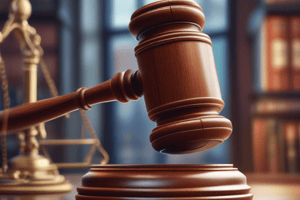Podcast
Questions and Answers
What does confidentiality primarily aim to prevent?
What does confidentiality primarily aim to prevent?
- The discussion of private lives
- The publication of personal photographs
- The leaking of confidential information (correct)
- The sharing of trade secrets
Which of the following is considered a form of confidential information?
Which of the following is considered a form of confidential information?
- General news articles
- Company cafeteria menus
- Personal health records (correct)
- Publicly available financial reports
What must a complainant show to succeed in a breach of confidence case?
What must a complainant show to succeed in a breach of confidence case?
- The defendant had ill-intent
- The information was shared in public
- A financial loss occurred
- The triple test was met (correct)
What does the 'quality of confidence' refer to in a confidentiality case?
What does the 'quality of confidence' refer to in a confidentiality case?
Under what legal framework is confidentiality primarily dealt with?
Under what legal framework is confidentiality primarily dealt with?
What can happen if a publisher ignores an injunction related to confidentiality?
What can happen if a publisher ignores an injunction related to confidentiality?
What is NOT a requirement for information to be considered confidential?
What is NOT a requirement for information to be considered confidential?
In which situation can an interim injunction be sought?
In which situation can an interim injunction be sought?
Flashcards
What is confidentiality?
What is confidentiality?
Confidentiality is a principle that protects information shared in trust. It prevents unauthorized disclosure, particularly when someone gains access to information in confidence.
What is confidential information?
What is confidential information?
Confidential information is data that a reasonable person would consider private and of importance. Examples include trade secrets, personal health records, and financial details.
What is an injunction?
What is an injunction?
An injunction is a court order that forbids a person from publishing or disclosing confidential information. It acts as a 'gagging order'.
What is a breach of confidence?
What is a breach of confidence?
Signup and view all the flashcards
What is the 'Triple Test'?
What is the 'Triple Test'?
Signup and view all the flashcards
What are some scenarios where confidentiality arises?
What are some scenarios where confidentiality arises?
Signup and view all the flashcards
How can a journalist defend against a breach of confidence claim?
How can a journalist defend against a breach of confidence claim?
Signup and view all the flashcards
What is the relationship between confidentiality and the Official Secrets Act?
What is the relationship between confidentiality and the Official Secrets Act?
Signup and view all the flashcards
Study Notes
Confidentiality
- Confidentiality is a principle where information given in confidence cannot be misused.
- Confidential information is anything a reasonable person would consider private, significant in nature, such as trade secrets, personal information (health, sex life), or company finances.
- Injunctions (gag orders) can be issued to prevent publication of confidential information, which can be challenged by the publisher.
- Ignoring an injunction can result in being held in contempt of court.
- Parliamentary privilege protects legislators from legal consequences for statements made in Parliament, enabling media to report on them.
Legal Aspects
- Confidentiality cases are handled civilly.
- Legal measures, like the Official Secrets Act, restrict public release of government secrets.
- Journalists obtaining sensitive information (commercial/medical) have a duty not to reveal it unless a defense can be proven.
Breach of Confidence
- A complainant must prove a publisher breached confidentiality by meeting the Triple Test.
- The three parts of the Triple Test include:
- Obligation of confidence: Information must have been given under circumstances creating a confidence obligation. Examples include employee/employer, spousal relations, or confidential relationships.
- Quality of confidence: Information needs to be significant, not trivial. Already being public knowledge makes it less confidential.
- Detriment: Publication must cause harm to the information owner.
Defences
- Consent: The information owner agreed to its release..
- Public domain: Information readily available to the public.
- Public interest: Disclosure benefits the public (e.g. exposing wrongdoing).
- Correcting a false image: Providing accurate information to counteract a false impression.
Studying That Suits You
Use AI to generate personalized quizzes and flashcards to suit your learning preferences.




